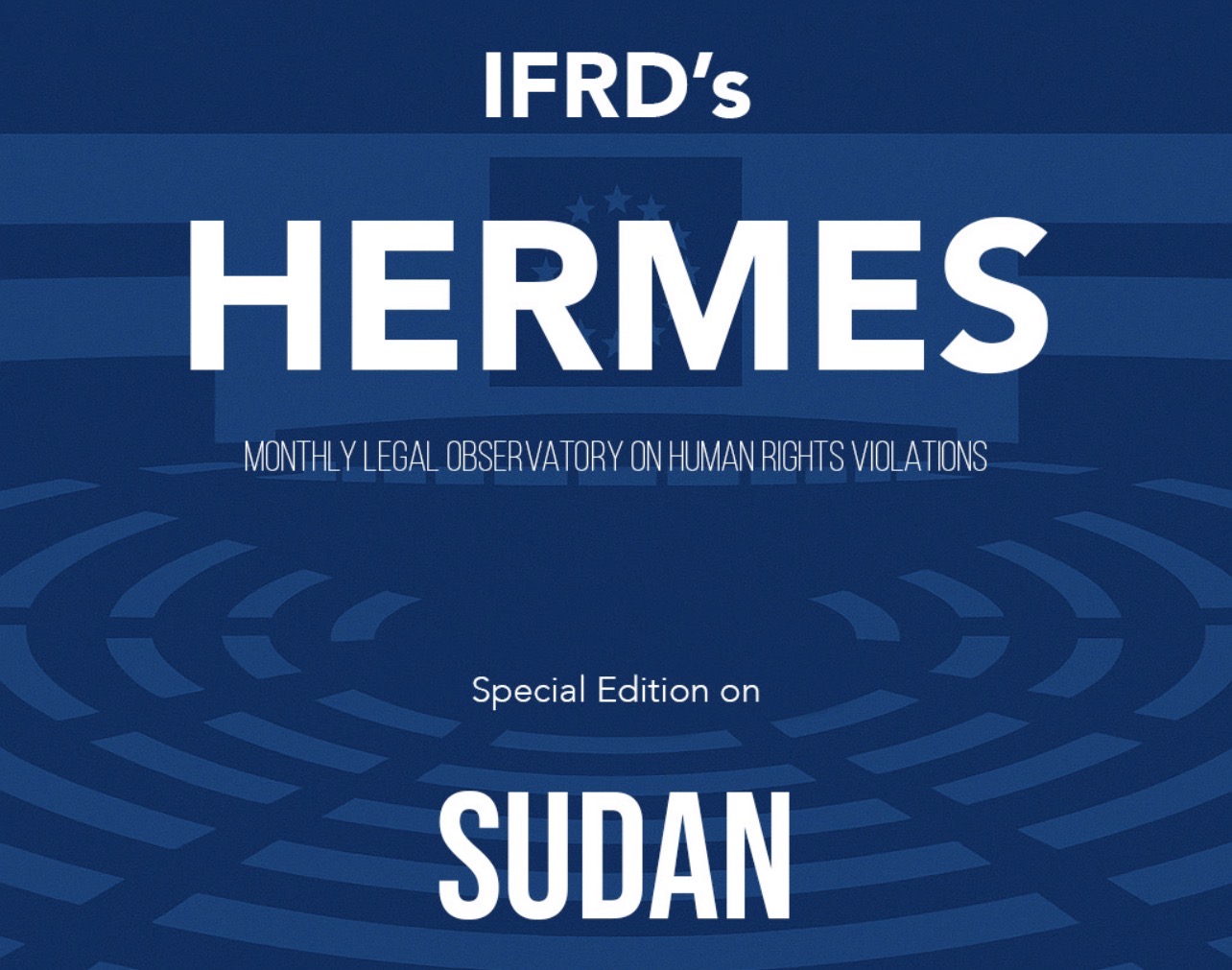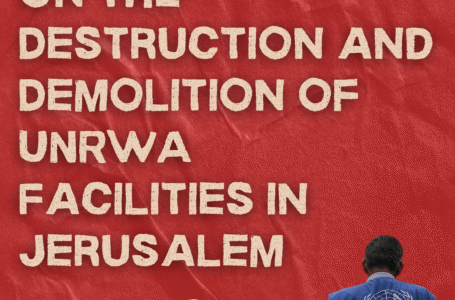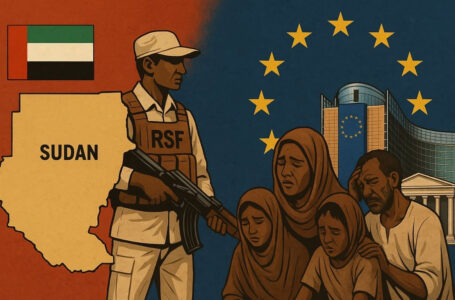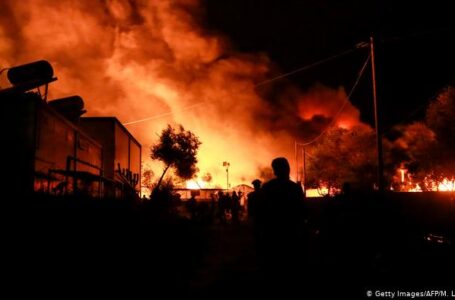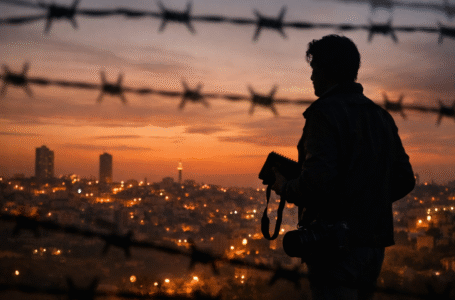Legal observatory on Human rights violations
Special Edition on SUDAN
Executive summary
Between 20 and 30 October 2025 the conflict in Sudan escalated precipitously following the RSF’s full-scale takeover of El-Fasher. Credible and verifiable reporting documents summary executions, mass arrests, abductions of journalists and civic leaders, extortion and sexual violence at RSF checkpoints, widespread obstruction of humanitarian assistance, and intensified drone and aerial attacks in popular areas. These events, taken together, reveal a pattern of conduct by the Rapid Support Forces (RSF) that is incompatible with the Geneva Conventions, customary IHL, and core international human-rights obligations, and that amount to war crimes and crimes against humanity.
This briefing synthesizes verified open-source material produced between October 20 and 30, 2025 (press agencies, UN / OHCHR statements, major human-rights NGOs and authenticated social-media video evidence where noted). Reports were cross-checked across at least two reputable sources when possible.
1. Situation snapshot (20–30 October 2025)
1. Fall of El-Fasher and RSF consolidation. The RSF announced it had taken control of El-Fasher after almost 500 days of siege; the city’s fall was followed by multiple videos and eyewitness accounts showing extrajudicial killings and other serious violations against people fleeing the city. Displaced populations fled to surrounding towns in large numbers.
2. Summary executions and mass violence. Dozens of short videos show RSF fighters carrying out summary executions of unarmed civilians on streets and at checkpoints immediately after the city fell. Credible evidence points to mass atrocities in captured areas. On 29 October 2025, the Rapid Support Forces (RSF) captured the Saudi Maternal Teaching Hospital in El-Fasher and carried out mass killings of patients, medical staff and detainees. According to the World Health Organization and multiple aid-worker testimonies, about 460 peoplewere killed inside the hospital during the assault, many while seeking emergency care.
3. Abductions and targeted killings of civic actors and journalists.Former MP and rights advocate Siham Hassan Husballah Ali was abducted and killed following the RSF takeover of El-Fasher (reported 26–27 Oct); journalist Muammar Ibrahim was abducted by RSF while reporting from El-Fasher on Oct. 27. These incidents indicate deliberate targeting of civic voices and journalists.
4. Extortion, sexual violence and rape at RSF checkpoints (19–27 Oct).Multiple eyewitness accounts and regional reporting describe RSF checkpoints near Shagra and Garni where displaced families were stopped, charged tolls (reported as 200,000 Sudanese Pounds per family), and where at least three rape cases against displaced women were reported.
5. Drone and aerial strikes intensify in populated areas. The UN designated expert publicly expressed alarm (24 Oct) at the sharp escalation in drone attacks by the RSF that endanger civilians and civilian infrastructure — a dynamic corroborated by satellite imagery and other reporting.
6. Humanitarian displacement and suffering. Fighting around El-Fasherhas triggered a threefold increase in displaced persons in surrounding towns and a massive flow of internally displaced persons (IDPs).UNICEF and IOM report catastrophic levels of displacement and extreme shortages of food, medicine and services.
7. Allegations of external military support and arms flows. Investigative journalism and UN documents point to ongoing illicit arms flows to RSF elements, including drones and other material allegedly linked to external suppliers. These flows have undermined the UN embargo and materially escalated RSF capabilities.
2. Documented categories of violations
A. Extrajudicial killings and summary executions
Evidence: Multiple verified videos show RSF fighters executing unarmed civilians in the streets of El-Fasher and along transit routes for those fleeing the city. Witnesses reported dozens of executions in the immediate aftermath of the takeover. These acts appear deliberate and widespread.
Legal note: Intentionally directing attacks against civilians and committing executions of persons hors de combat are grave breaches under Common Article 3 and Additional Protocol II (applicable to non-international armed conflicts) and are war crimes under Article 8 of the Rome Statute. The scale and systematic character may also amount to crimes against humanity.
Additional evidence: The hospital massacre at the Saudi Maternal Teaching Hospital in El-Fasher (29 Oct 2025) where more than 460 individuals – patients, companions, medical staff – were reportedly executed by RSF forces.
Legal note (amended): The deliberate attack and killing of wounded persons, patients and medical staff in a functioning hospital constituent grave breaks of Common Article 3 and Additional Protocol II (non-international conflict) and qualify as war crimes.
B. Abduction and targeted killing of civic leaders and journalists
Evidence: Reports that former MP Siham Hassan (a prominent Darfuri civic figure) was abducted and later killed after RSF entered El-Fasher; the abduction of journalist Muammar Ibrahim on 27 Oct — both incidents are independently reported by multiple outlets and human-rights monitors.
Legal note: The targeting, abduction and killing of journalists and humanitarian volunteers violent protection afforded to civilians and persons engaged in humanitarian and journalistic work (Geneva Conventions; Article 79 Additional Protocol I). Such conduct, when widespread, evidences a strategy to silence witness and deprivation affected populations of protection and information.
C. Extortion, rape and sexual violence at checkpoints
Evidence: Eyewitness testimony and regional reporting describe RSF checkpoints near Shagra and Garni (19 Oct) where displaced families were detailed, exported and where at least three rapes were reported. Survivors give consistent accounts of sexual violence used as a coercive tool.
Legal note: Systematic sexual violence (rape, sexual slavery, forced marriages) committed as part of an attack on a civilian population constitutes crimes against humanity (Rome Statute, Art. 7(1)(g)) and war crimes (Art. 8). The use of sexual violence in displacement and detention contexts violates treaty obligations and customary law.
Supplementary evidence: The hospital attack also directly obstructed humanitarian operations: hundreds of displaced and wounded persons lost access to emergency care, further straining an already collapsing health system. This incident thereby constitutes both an attack on humanitarian infrastructure and a denial of medical relief to civilians.
Legal note: The deliberate targeting of a hospital—as a civilian object indispensable to the survival of the population—and the resultant denial of care to the injured or sick supports the classification of war crimes under Article 8(2) (b) (xxv) and complements obligations under IHL to ensure humanitarian access (Art. 18 Fourth Geneva Convention) and medical protections under the Geneva Framework. Following case law for the International Criminal Court in the ICC Ntaganda Judgment(No. ICC-01/04-02/06-A2, par. 1116-1120), intentionally attacking hospitals constitutes a war crime.
D. Obstruction of humanitarian assistance and starvation risk
Evidence: Verified footage and humanitarian reporting show humanitarian convoys prevented from reaching desired neighborhoods; checkpoints and drawing impede aid delivery; displacement and supply disruptions have precipitated acute hunger. We report dramatic spikes in displacement and humanitarian needs around Tawila and environs after El-Fasher fell, with the most recent example being the abduction of medical and humanitarian staff in the Saudi Maternal Teaching Hospital in El-Fasher.
Legal note: Deliberately impeding relief supplies and creating famine conditions constitute war crimes (Rome Statute Art. 8(2)(b)(xxv)) and violent Article 54 of Additional Protocol I, as also confirmed by the International Court of Justice in the Bosnia Genocide Case (2007).Denial of humanitarian access is expressly prohibited under customary IHL and relevant UN Security Council resolutions.
E. Intensive use of drones and aerial attacks in civilian areas
Evidence: UN expert statements (24 Oct) highlight the sharp escalation in RSF drone strikes in urban areas, increasing civilian casualties and damage to infrastructure. Satellite imagery and testimonies confirm deliberate airstrikes by RSF on populated areas, resulting in “blood lakes” in besieged El-Fasher.
Supplementary evidence: On 19 October 2025, a drone strike in El Geneina, Saraf Omra, North Darfur, killed at least seven civilians and injured six others when a drone struck a crowded market and adjacent fuel station. The attack also hit vehicles, indicating use of civilian infrastructure as a target zone.
Legal note: The use of aerial weapons in populated areas gives rise to rigorous distinction and proportionality obligations. Indiscriminate or disproportionate drone or air attacks that strike civilian objects are war crimes (Rome Statute)., in violation of Article 51 of Additional Protocol I, which prohibits attacks directed against civilians.
3. Legal assessment — gravity and characterization
Based on the verified facts from 20–30 October 2025, IFRD’s legal assessment is:
• The RSF’s conduct in El-Fasher and adjacent areas amounts to multiple war crimes, including summary executions, attacks against civilians, obstruction of humanitarian relief, and sexual violence.
• The systematic nature of many of these acts (widespread executions, targeted killings of political figures and journalists, sexual violence used as a coercive tool, and ethnic targeting reported previously and in related areas) raises substantial grounds to consider that crimes against humanity are being committed. The intentionality and pattern may also meet elements of genocide where incidents are directed at protected ethnic groups (e.g. Masalit), subject to full evidentiary testing.
• The intensification of RSF capabilities through externally-sourced weaponry (drones, sophisticated systems) materially increases the risk and scale of violations and raises serious questions of complicity by external actors facilitating those flows. Investigative reporting indicates continued illicit flows that undermine the UN embargo and enable RSF operations.
• The abduction and killing of civic actors and journalists suggests an intention to eliminate oversight, destroy evidence and terrorize civilian populations, aggravating culpability under international criminal standards.
4. Accountability mechanisms — status and constraints
• International Criminal Court (ICC): The situation in Sudan remains within the ICC’s historical mandate (UNSC referral, 2005), but effective ICC action depends on investigative access and political backing. The scale of recent events calls for renewed international investigative action and evidence preservation initiatives.
• UN embargo/sanctions framework: The Darfur arms embargo and associated measures exist but are being undermined by illicit supply chains. Enforcement gaps must be urgently addressed.
• National justice: Sudan’s domestic capacity for indirect investigation and prosecution is currently absent in many affected areas due to collapse of governance and control by armed actors; this increases the importance of international accountability avenues.
5. Evidence preservation and urgent needs
To enable future prosecutions and documentation of crimes, IFRD recommendations:
• Immediate, secure collection and preservation of video, audio, forensic and witness testimonies from El-Fasher and transit routes (with protections for witnesses).
• Rapid forensic assessments of alleged mass graves and execution sites by indirect international teams.
• Humanitarian corridor guarantees for displaced individuals and protection of relief workers to prevent further starvation and displacement.
The events of 20–30 October 2025 demonstrate a significant and dangerous escalation in Sudan, centered on the RSF’s capture of El-Fasher and followed by credible allegations of summary executions, sexual violence, abductions and obstruction of aid. The pattern and scale of violations indicate grave breaks of IHL and IHRL and substantiate the need for immediate international attention, enhanced documentation, and renewed steps toward accountability.
This period marks a shift from protracted conflict to mass atrocity patterns and trans-border terrorism.
This report categorized the violations of international humanitarian law into the following categories:
1. Targeting of Civilians & Extrajudicial Killings
Reports indicate summary executions of civilians, including individuals attempting to flee and community leaders refusing to cooperate with RSF forces.
Legal Framework Violated:
• Geneva Convention IV (1949) – Arts. 27, 32, 147 (protection of civilians; prohibition of murder)
• Additional Protocol I (1977) – Arts. 51(2), 75 (prohibition on violence to life, outrages upon personal dignity)
• Rome Statute – Art. 7(1)(a), Art. 8(2)(e)(i) (murder as a war crime & crime against humanity)
Legal Characterization:
Intentional killing of non-combatants amounts to war crimes and crimes against humanity.
2. Sexual Violence and Conflict-Related Rape
Documented incidents include the rape of displaced women at checkpoints and sexual violence during detention.
Legal Framework Violated
• Geneva Conventions Common Art. 3
• Additional Protocol II – Art. 4(2)(e)
• Rome Statute – Art. 7(1)(g), 8(2)(e)(vi)
Legal Characterization:
Systematic sexual violence constitutes crimes against humanity and war crimes.
3. Forced Displacement, Extortion & Civilian Sieges
RSF forces reportedly imposed forced “tolls” on fleeing civilians, denied safe passage, and blocked humanitarian relief, leaving families stranded or detained.
Legal Framework Violated:
• Geneva Convention IV – Art. 49 (forcible transfers)
• Additional Protocol I – Arts. 70, 54 (access to aid; prohibition on starvation)
• UNSC Res. 2417 (2018) (hunger as a method of warfare)
• Rome Statute – Art. 7(1)(d), 8(2)(b)(xxv)
Legal Characterization:
These acts constitute war crimes, including starvation as a method of warfare and forcible transfer.
4. Attacks on Humanitarian Personnel & Civil Infrastructure
Documented RSF actions include:
• Killing of civilian volunteers distributing food
• Abduction of journalists providing humanitarian reporting
• Blocking medical/humanitarian convoys
Legal Framework Violated:
• Additional Protocol I – Art. 70 (protection of relief operations)
• Additional Protocol I – Art. 79 (protection of journalists)
• Rome Statute – Art. 8(2)(e)(i), 8(2)(b)(iii)
Legal Characterization:
Direct attacks on aid workers and press are war crimes.
The IFRD warrants that failure to act risks allowing an unfolding mass atrocity crime environment to escalate further, undermining global commitments to civilian protection and accountability under international law.
The European Parliament cannot claim adherence to EU Treaty values (democracy, rule of law, humanitarian values) while remaining inactive in the face of documented war crimes, starvation tactics, and ethnic persecution.
Silence in this context risks amounting to complicity under international law.
International Treaties & Conventions
Geneva Convention Relative to the Protection of Civilian Persons in Time of War (IV). (1949). Geneva: United Nations.
Protocol Additional to the Geneva Conventions of 12 August 1949, and Relating to the Protection of Victims of International Armed Conflicts (Protocol I). (1977). Geneva: United Nations.
Protocol Additional to the Geneva Conventions of 12 August 1949, and Relating to the Protection of Victims of Non-International Armed Conflicts (Protocol II). (1977). Geneva: United Nations.
Convention on the Prevention and Punishment of the Crime of Genocide. (1948). Paris: United Nations.
Convention on the Rights of the Child. (1989). New York, NY: United Nations.
Convention on the Elimination of All Forms of Discrimination AgainstWomen. (1979). New York, NY: United Nations.
International Covenant on Civil and Political Rights. (1966). New York, NY: United Nations.
Rome Statute of the International Criminal Court. (1998). The Hague, Netherlands: International Criminal Court.
United Nations Security Council Resolution 2417. (2018). S/RES/2417. New York, NY: United Nations Security Council.
International Case Law
International Criminal Tribunal for Rwanda (ICTR)
Prosecutor v. Akayesu, Case No. ICTR-96-4-T (International Criminal Tribunal for Rwanda, Sept. 2, 1998).
International Criminal Tribunal for the Former Yugoslavia (ICTY)
Prosecutor v. Tadić, Case No. IT-94-1-A (International Criminal Tribunal for the Former Yugoslavia, July 15, 1999).
International Court of Justice (ICJ)
Application of the Convention on the Prevention and Punishment of the Crime of Genocide (Bosnia and Herzegovina v. Serbia and Montenegro), I.C.J. Reports 2007.
Legal Consequences of the Construction of a Wall in the Occupied Palestinian Territory, Advisory Opinion, I.C.J. Reports 2004.
ICC Ntaganda Judgment (No. ICC-01/04-02/06-A2)
UN Human Rights Reports
United Nations Office of the High Commissioner for Human Rights. (2025). Report on the human rights situation in Sudan, 1 January – 30 June 2025. Geneva: OHCHR.
United Nations Office for the Coordination of Humanitarian Affairs. (2025). Situation updates on Sudan. New York, NY: OCHA.
News and Verified Sources Used for Factual Incidents
Al Jazeera. (2025). Sudan: RSF accused of killing civilians after capture of El-Fasher. Al Jazeera Media Network.
BBC News. (2025). Sudan conflict escalation and civilian toll. BBC.
Associated Press. (2025). Sudan hospital attacked as RSF advances in Darfur. AP News.
CNN. (2025). Israeli strikes in Gaza intensify with civilian deaths mounting. CNN.
Human Rights Watch. (2025). Sudan: Mass killings and starvation crimes in Darfur. HRW.
Amnesty International. (2025). Sudan: Civilians trapped amid RSF siege and famine. Amnesty International.

